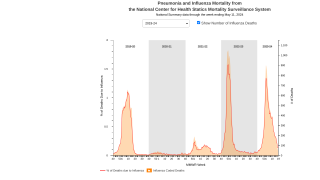Universal Flu Shot Remains Elusive

‘Every year, we’re reminded why can’t we have a flu vaccine that offers long-term protection, like those for measles or polio?'
‘That’s because the influenza virus continuously evolves, so the immune response humans build up each year might not work the next year,’ said Gabriel D. Victora, Ph.D., an assistant professor at The Rockefeller University, in a December 20, 2019, press release.
Already in late 2019, the Centers for Disease Control and Prevention (CDC) estimated on December 14th that during this flu season, there have been at least 3.7 million flu illnesses, 32,000 hospitalizations, and 1,800 related fatalities.
And, the CDC has confirmed 19 pediatric fatalities related to 2019 flu viruses.
But, new findings recently published in Cell give an indication ‘why making a general-purpose vaccine that guards against all versions of the flu is so hard to produce.’
‘Instead of improving its memory of the previous version of the influenza virus, the immune system develops its response to the new virus variant from scratch, mostly using immune cells that have no memory of the virus.’
“If we can help the immune system to keep building on what it has already learned, we could develop better vaccines for highly evolving viruses like the flu, or HIV, or Hepatitis C,” says Dr. Vicora.
In this study, Dr. Victora and team explored the behavior of immune cells in mice after a 1st and 2nd exposure to a flu vaccine.
Specifically, they looked at B cells, white blood cells that release antibodies.
During an infection or immunization, B cells enter so-called germinal centers in the lymph nodes, where they mutate many times until they evolve to target the new invader.
“A germinal center is like a boot camp,” said Dr. Victora.
“They go in very bad, they come out very good, releasing better antibodies that bind more tightly to their targets.”
Those very good B cells are the immune system’s cellular memory and can release antibodies that latch on to one part of the virus.
Ideally, these B cells would return to the germinal centers the next time the body is faced with a virus or vaccine and evolve even more sophisticated antibodies to target the slightly different version of the virus even better, ultimately becoming able to produce the so-called broadly neutralizing antibodies that the virus can’t escape from.
And that’s what researchers need in order to make a universal vaccine.
“The idea is you would keep calling memory cells back into germinal centers by repeated vaccination,” Dr. Victora says, “in order to make them evolve several times until they become the super B cells that you need to give you a universal flu vaccine or an HIV vaccine.”
But instead of seeing the B cells return, the researchers found something different.
They genetically marked the mice’s germinal centers with fluorescent colors during the first vaccination so they could track the behavior of their descendants during the 2nd vaccination.
To their surprise, more than 90 percent of the B cells that entered the germinal centers on the 2nd vaccination were uncolored—a sign that they were newcomers.
Genetic analysis also revealed these cells hadn’t gone through the mutation process that germinal center B cells typically undergo, further suggesting they were present in that site for the first time.
The boot camp veterans, however, were mostly absent.
Out of the hundreds of types of B cells that entered the germinal centers on the first vaccination, only a few made it back the second time, despite many of them being able to bind to the virus. It appears that coming back a second time is reserved only for a chosen few B cells.
This finding, if further studies show is also the case in humans, has implications for vaccine design.
In order to arrive at strong B cells, researchers need to understand what is blocking the cells from returning to camp.
“If we can understand these bottlenecks that don’t allow these cells back in, that might help us to find a way to circumvent them, making it easier for repeated vaccination approaches to work,” Victora says.
This would give the cells the chance to undergo the many rounds of mutations they need in order to arrive at antibodies that target all variants of virus-like flu.
This data also suggests that, in order to be efficiently targeted by sequential immunization, an epitope must be rendered dominant from the very beginning.
Furthermore, the CDC says ‘It’s not too late to get vaccinated.’
‘Influenza vaccination is always the best way to protect yourself from the various flu viruses and its potentially serious complications.’
And, antiviral medications are an important adjunct to the flu vaccine in the control of influenza.
Almost all (>99%) of the influenza viruses tested this season are susceptible to the FDA-approved influenza antiviral medications recommended for use in the USA for the 2019-2020 flu season, said the CDC on December 20th.
This research work was funded by NIH/NIAID grants, with additional support from Gates Foundation grant and NIH grant, research grants from The Ministry of Education, Culture, Sports, Science, and Technology, by a Rockefeller University Helmsley Postdoctoral Fellowship, a Boehringer-Ingelheim Fonds Ph.D. fellow, a Cancer Research Institute-Irvington postdoctoral fellow, a Louis and Rachel Rudin Fellowship in Immunology and NIGMS Medical Scientist Training Program, a Burroughs-Wellcome Investigator in the Pathogenesis of Infectious Disease, a Pew-Stewart Scholar, and a MacArthur Fellow.
The authors declare no competing interests.
About: The world’s leading biomedical research university, Rockefeller draws top scientists and graduate students from around the world in pursuit of one mission: to conduct science for the benefit of humanity. In 1955, The Rockefeller Institute expanded its mission to include education and admitted its first class of graduate students. The Rockefeller Institute became The Rockefeller University, broadening its research mandate further.
Influenza news published by Precision Vaccinations.
Our Trust Standards: Medical Advisory Committee


























